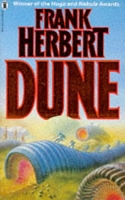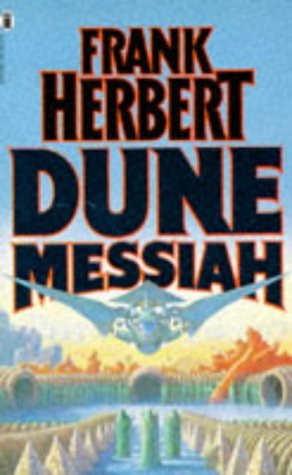

Arrakis, a planet where no rain falls, where no oceans exist and where no rivers flow is a planet whose worth is immeasurable. It is a desert planet along most of its altitudes barring the polar ice caps and it is where melange is harvested at great peril and expense by the ruling houses. To add to this danger tremendous winds, sandstorms and giant sand worms continually and unseen cross the desert devouring anyone or anything they detect on the surface. A despotic regime which oversaw the running of Arrakis - House Harkonnen - has been succeeded by a more humane house - House Atreides. Duke Leto Atreides now newly appointed to run Arrakis uproots from his home planet of Caladan, a planet the complete antithesis of Arrakis with his concubine Lady Jessica and son Paul. He is a wise and kind leader who seeks out the trust and friendship of the local and fabled indigenous Fremen who have been a thorn in the side of the departing House Harkonnen. Lady Jessica is a Bene Gesserit witch and her son Paul is a fifteen year to whom the Fremen believe may be their religion's saviour and apotheosis. Frank Herbert's prose is at times a little too tight and serious and the characters seem just a tad too magnificent in their depths of depravity and heights of enlightenment. The planet's harshness and beauty itself is told through the eyes of people - both native and foreign - who become ensnared in its history either through their bloodletting or bloodwater as the Freemen refer to liquids of the recently fallen, such is the need for water on their planet: or their own lives. This novel is a battle for Arrakis. This novel is simply breathtaking in its scope and simply towers above almost any other science fiction novel I have ever read.


Dune Messiah picks up some twelve years after the defeat of the corrupt emperor and House Harkonnen, and Paul's ascension to the throne. Paul Atreides is now emperor and rules a planet over which he wishes to change ecologically. He and his sister Alia are viewed as gods by the populace of Arrakis, something which bears down on both of them heavily. Paul is troubled and sees enemies everywhere. He presides over an inter galactic empire and the taking and making of this entity, accomplished through Jihad. It is one he tried so desperately tried to avert but failed in doing so. He now wishes to free himself from the yolks and chains of his reverence and fear. This follow up to Dune is nowhere as good as its predecessor but has a quality all its own. In place of a young man coming to terms with his destiny we have a god emperor trying to find inner peace and a final resolution. It is a novel permeating with Machiavellian politics and subterfuge right from the beginning. Prescience has its benefits but also its blind spots. This novel lacks the sense of wonder Dune created and replaces it with cloak and dagger politics, assassinations and inter personal manipulations. The price we pay is knowing that this novel could have contained more mystery but instead is littered with selfish beings, almost all sophists and martyrs in their own minds, following narrow minded agendas. Overall a good read but it is too short and the storyline too condensed to make it a classic.

| Authors | Awards | Blogs |
| Fanzines | Index | Magazines |
| Publishers | Retailers | Reviews |